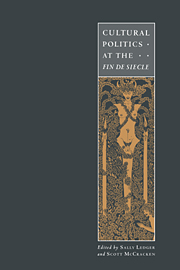Book contents
- Frontmatter
- Contents
- List of illustrations
- Notes on contributors
- Acknowledgements
- Introduction
- 1 The flight to the real
- 2 The New Woman and the crisis of Victorianism
- 3 Empire, ‘race’ and feminism at the fin de siècle: the work of George Egerton and Olive Schreiner
- 4 W. B. Yeats and Irish cultural politics in the 1890s
- 5 The double lives of man: narration and identification in late nineteenth-century representations of ec-centric masculinities
- 6 Henry James and the spectacle of loss: psychoanalytic metaphysics
- 7 ‘A very curious construction’: masculinity and the poetry of A. E. Housman and Oscar Wilde
- 8 The Pilgrims of Hope: William Morris and the dialectic of romanticism
- 9 Urban utopias: socialism, religion and the city, 1880 to 1900
- 10 Vampires and the empire: fears and fictions of the 1890s
- 11 Utopia, Limited: nationalism, empire and parody in the comic operas of Gilbert and Sullivan
- 12 Technologies of monstrosity: Bram Stoker's Dracula
- 13 Postmodernism, a Chance to reread?
- 14 Is market society the fin of history?
- Select bibliography
- Index
11 - Utopia, Limited: nationalism, empire and parody in the comic operas of Gilbert and Sullivan
Published online by Cambridge University Press: 29 September 2009
- Frontmatter
- Contents
- List of illustrations
- Notes on contributors
- Acknowledgements
- Introduction
- 1 The flight to the real
- 2 The New Woman and the crisis of Victorianism
- 3 Empire, ‘race’ and feminism at the fin de siècle: the work of George Egerton and Olive Schreiner
- 4 W. B. Yeats and Irish cultural politics in the 1890s
- 5 The double lives of man: narration and identification in late nineteenth-century representations of ec-centric masculinities
- 6 Henry James and the spectacle of loss: psychoanalytic metaphysics
- 7 ‘A very curious construction’: masculinity and the poetry of A. E. Housman and Oscar Wilde
- 8 The Pilgrims of Hope: William Morris and the dialectic of romanticism
- 9 Urban utopias: socialism, religion and the city, 1880 to 1900
- 10 Vampires and the empire: fears and fictions of the 1890s
- 11 Utopia, Limited: nationalism, empire and parody in the comic operas of Gilbert and Sullivan
- 12 Technologies of monstrosity: Bram Stoker's Dracula
- 13 Postmodernism, a Chance to reread?
- 14 Is market society the fin of history?
- Select bibliography
- Index
Summary
Gilbert and Sullivan's collaborative ‘commitment to the foundation of a school of native English opera’ involved a complex programme of reform: of current theatrical genres and practices, of several relatively distinct musical traditions, and of the theatre-going audience and its expectations. In 1888, with a tone of boastful gusto, Gilbert wrote to Sullivan: ‘We have the best theatre, the best composer, and (though I say it) the best librettist in England working together – we are world-known, and as much an institution as Westminster Abbey.’ The far-flung diffusion of their reputation that Gilbert imagines in this comment is quickly anchored and focused by the nostalgic monumentality of the Abbey; like the empire itself, their reputation is both worldwide and particularly English. And indeed, the comic appeal of the operas of W. S. Gilbert and Arthur Sullivan has always been linked strongly to their affectionate depiction of the peculiar styles of being – that is to say, of ‘acting’ – English. The establishment, rise, and fall of Gilbert and Sullivan opera as a national tradition has recently been treated in a provocative essay by David Cannadine.
When turned upon the cultural politics of his own culture, however, Gilbert's reforming instincts were not always entirely affectionate.
- Type
- Chapter
- Information
- Cultural Politics at the Fin de Siècle , pp. 221 - 247Publisher: Cambridge University PressPrint publication year: 1995
- 2
- Cited by



